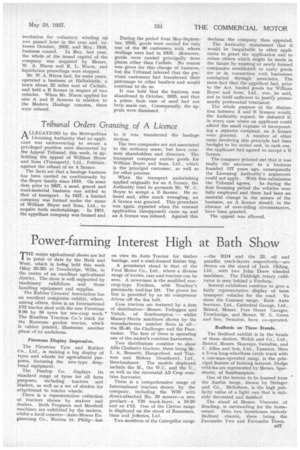Tribunal Orders Granting of A Licence A LLEGATIONS by the Metropolitan
Page 41

If you've noticed an error in this article please click here to report it so we can fix it.
Licensing by that an applicant was endeavouring to secure a privileged position were discounted by the Appeal Tribunal, this week, in upholding the appeal of William Boyer and Sons (Transport), Ltd., Feltham. against the refusal of an A licence.
The facts are that a haulage business has been carried on continuously by the Boyer family since 1810. • On some date prior to 1927, a sand, gravel and road-material business was added to that of transport. In 1927, a. limited company was formed under the name of William Boyer and Sons. Ltd., to acquire both undertakings. In 1931, the appellant company was formed and to it was transferred the haulage section.
The two companies are not associated in the ordinary sense, hut have common shareholders and directors. The transport company carries goods for William Boyer and Sons, Ltd., which is the principal customer, as well as for other persons.
When the transport undertaking applied originally for an A licence, the Authority tried to persuade Mr. W. G. Boyer to accept a B licence. He refused and, after much wrangling, an A licence was granted. This procedure was again repeated when the renewal application (unopposed) came up and an A licence was refused. Against this decision the company then appealed.
The Authority maintained that it would be inequitable to other applicants to grant the application and to refuse others which might be made in the future by existing .or newly formed companies established to carry goods for or in connection with businesses conducted through associates. The mere fact that the appellant had, prior to the Act, hauled goods for William Boyer and Sons, Ltd., was, he said, not in itself sufficient to justify permanently preferential treatment.
The whole purpose of the distinction between 'A and B licences' would, _ the Authority argued, be defeated if; in every case where an applicant could afford the small expense of incorporating a separate company, an A licence were granted. A nurnber of other cases involving this principle had been broiight to his notice and, in each one, the applicant had agreed to accept a B licence.
The company pointed out that it was really the successor to a business founded 127 years ago, consequently the Licensing Authority's arguments could not apply. With this subthission the Tribunal agrees. As during the first licensing period the vehicles were fully employed and there had been no material change in the nature of the business, an A licence should, in the absence of over-riding circumstances, have been granted.
The appeal. was allowed.




























































































